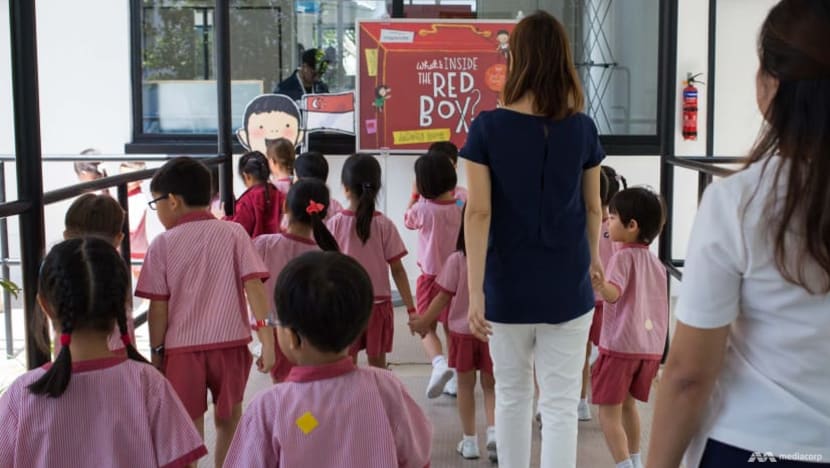Teachers in Government-supported pre-schools to get pay bump of up to 30% over next 2 years
Fresh graduates with an ECDA-approved diploma can expect a starting monthly salary of at least S$2,800 at anchor operator pre-schools from next year.

A preschool teacher with children. (File photo: TODAY)
SINGAPORE: Teachers in Government-supported pre-schools can expect their monthly salaries to increase by 10 to 30 per cent over the next two years, said Minister for Social and Family Development Masagos Zulkifli on Saturday (Oct 29).
Better performers will receive higher increases, he added.
“This is a significant move to allow pre-schools to better attract and retain talent, to support the sector’s continued growth in the coming years,” said Mr Masagos, speaking at the Early Childhood Celebrations 2022.
“Educators must take charge of their own professional development. Growing in skills and competencies, as well as taking on larger and more complex job roles, will in turn enhance career and salary prospects.”
With the pay bump, an educator in an anchor operator pre-school can expect a gross monthly salary ranging from S$2,900 to S$6,600 by 2024, depending on their experience, skills and work performance, said the Early Childhood Development Agency (ECDA) in a separate press release.
Fresh graduates and mid-career entrants with an ECDA-approved early childhood diploma can expect a starting monthly salary of at least S$2,800 at anchor operator pre-schools next year, up from about S$2,600 this year.
Anchor operators currently employ more than 40 per cent of the early childhood-certified workforce.
ANOTHER 3,500 TEACHERS NEEDED
Average salaries for educators in Government-supported pre-schools have increased by about 20 per cent from 2018 to 2021, outpacing the general market, said Mr Masagos.
"This is an average across different job roles. This growth has outstripped the general market increase of about 6 per cent per year for similar jobs," said an ECDA spokesperson, adding that the agency regularly reviews pre-school salaries.
“But more needs to be done to ensure educators’ salaries commensurate with their increasing contributions and professional skills,” said Mr Masagos.
There are currently more than 23,000 early childhood educators in Singapore, he said. But to support the sector's expansion, another 3,500 educators are needed by 2025.
Based on current workforce trends and training pipelines, ECDA expects three-quarters of this growth to come from mid-career entrants, said the agency's spokesperson.
The attrition rate in the sector has been about 10 to 15 per cent over the last few years, the spokesperson added.
In August, the Ministry of Education (MOE) announced that teachers, allied educators and MOE kindergarten educators would receive a salary increase of 5 to 10 per cent from Oct 1 this year.
About 35,000 education officers, 1,600 allied educators and 800 MOE kindergarten educators received pay bumps.
Salaries for teachers and allied educators such as counsellors and student welfare officers were last reviewed in 2015, and the MOE kindergarten educator scheme was only introduced in 2019.
IMPROVING WORKING CONDITIONS
Anchor operators have put in place structured development programmes to support the growth and development of their educators, ECDA said in the press release.
Over the past few weeks, ECDA conducted a poll with centres and spoke to educators to better understand their experiences and perspectives, said Mr Masagos.
“Some said that it was challenging to spend enough time with your loved ones as you had to work after hours or on weekends. Others expressed that you did not feel adequately recognised as a professional or for your efforts in nurturing our children,” he said.
“Many of you also pointed out that you found yourself having to manage competing demands from children, parents, other colleagues and even ECDA.”
In the coming months, ECDA will engage operators, teachers and parents to develop solutions to improve educators’ well-being and working conditions, said Mr Masagos.
"Ideas include reviewing the requirement for centres to operate on Saturdays for better work-life balance and increasing non-contact time to allow for personal respite and professional reflection,” he added.
“We will also explore growing a pool of relief staff to better enable you to take leave to attend to your family and personal needs.”
The agency hopes to share the outcomes of these efforts by mid-2023, the minister said.
Centres typically source for relief staff either through their own networks such as former employees or tap on manpower recruitment agencies, said an ECDA spokesperson.
"Some centres have faced difficulty in recruiting relief staff, especially at short notice to cover educators who are on urgent leave or medical leave," the spokesperson added. "The idea of a central relief staff pool aims to provide centres with a reliable and suitable source of relief staff."
Some centres and educators have shared that the utilisation of centre services on Saturdays is low, the spokesperson said.
ECDA has also developed an HR good practices guide for operators and pre-school leaders with tips on how to improve working conditions and “create a positive work culture”.
The guide includes ideas to set aside non-contact time, leverage technology to improve productivity, and mentoring and professional development for educators.
“To all our educators, we are committed to supporting you as you continue the good work in partnering with families and the community to nurture and support our children,” said Mr Masagos.
“You are making a real difference in our children’s lives. We value you and we will continue to support you."


















